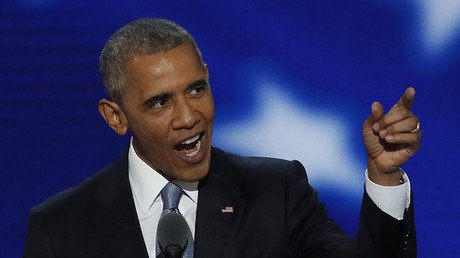US agency did no antitrust analysis of internet giveaway to private company - org

The handover of internet oversight to a non-profit group was announced this month, yet the US agency currently in charge of the internet domain name system did not consider the antitrust issues of the transition, according to a public records request.
On October 1, the US is going to surrender its oversight of the internet to the Internet Corporation for Assigned Names and Numbers (ICANN), a multi-stakeholder body and longtime contractor that has worked with National Telecommunications & Information Administration (NTIA) to conduct oversight of the Internet domain name system (DNS) and distribute global IP addresses.
The transition, however, has thus far not undergone an antitrust analysis, according to the NTIA, which recently responded to a Freedom of Information Act request from the non-profit group Americans for Limited Government (ALG).
"NTIA’s admission that they failed to consider the antitrust ramifications of transitioning governance over the Internet’s domain name system to ICANN since 2014, covering the entire period of the transition, is simply stunning," Rick Manning, president of ALG, wrote on August 26.
NTIA, an agency within the US Department of Commerce, said it found no records pertinent to the FOIA request.
Opponents of the transfer of power over the Internet Assigned Numbers Authority (IANA) away from US government control fear a private company could monopolize vital internet functions.
Despite prior warnings of antitrust implications concerning internet governance, "the politically blinded Obama Administration missed the obvious point that ICANN loses its anti-trust shield should the government relinquish control over the property to them," Manning wrote. "This, even as NTIA has in essence been preparing to create a global monopoly over the Internet’s domain name system. They didn’t even bother to ask if there would be any concerns with that."
ICANN, a California-based non-profit created in 1998, has assisted NTIA with DNS oversight and management of IANA operations. The transfer of such regulatory functions to ICANN starting in October will require the organization to communicate on all internet issues.
NTIA performed no antitrust analysis even as it pushed to create Internet monopoly https://t.co/nhmWw5yWmZ via @LimitGovt@realdonaldtrump
— Richard Manning (@rmanning957) August 26, 2016
“ICANN is uniquely positioned, as both the current IANA functions contractor and the global coordinator for the DNS, as the appropriate party to convene the multistakeholder process to develop the transition plan,” the NTIA said in March. Then, on August 16, the NTIA announced that "20-year effort to privatize the Internet domain name system," in consultation with a "global Internet multistakeholder community," would go forward on October 1.
ICANN is guided, in part, by a Government Advisory Committee made up of representatives of more than a hundred nations around the world.
Congressional Republicans are among the opponents of NTIA's actions with internet functions, saying that by giving up its oversight of the internet, the US would allow more opportunity for nations with undemocratic governments to control and censor the Web.
In May, US Senator Ted Cruz (R-Texas) wrote to NTIA Administrator Lawrence E. Strickling outlining similar concerns.
“The proposal will significantly increase the power of foreign governments over the Internet," he wrote in a letter, also signed by Senators James Lankford (R-Oklahoma) and Mike Lee (R-Utah). “Considering the current state of Internet freedom, it would be unconscionable to transfer supreme oversight authority of the Internet to an organization that is increasing the influence of foreign governments."
Obama plan to abandon the internet ignored antitrust exemption for @Icann, opening door to United Nations control https://t.co/n51SgcHct0
— Gordon Crovitz (@crovitz) August 29, 2016
The NTIA has insisted that the transfer of IANA functions and internet regulation to a private entity will not impact the world's internet users. Speaking in front of the House Judiciary subcommittee on the Internet in April, Strickling said that the transfer would be “the best measure to prevent authoritarian regimes from expanding their restrictive policies beyond their borders."
Supporters of the transfer include major companies such as Google, Amazon, Microsoft, and Facebook, as well as the US Chamber of Commerce.
"The longer the US government retains its role, the more the voices against multistakeholder approaches and an open internet will grow,"wrote Matthew Shears, director of global Internet policy at the Center for Democracy and Technology.
ALG's Manning said that Congress has a responsibility to block the transfer of IANA functions.
“Perhaps most importantly, the admission that anti-trust ramifications were not considered demonstrates that NTIA failed again to follow Congress’ mandate that they present a report on what could go wrong should the giveaway move forward."















